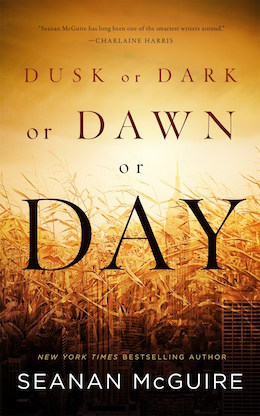Coming in at just under 200 pages in the paperback version, I’m not sure whether Seanan McGuire’s Dusk or Dark or Dawn or Day counts as a long novella or a short novel. It feels like an edge case: a liminal length for a story sliding elegantly across the edges of multiple subgenres, a story about liminal things.
Dusk or Dark or Dawn or Day is a ghost story, and a story about surviving suicide—or not, as the case may be. It lurks on the borders between urban fantasy and horror, neither committing to urban fantasy’s generally consolatory outlook nor to horror’s conviction of the inescapable malice of an uncaring (or inimical) universe.
Jenna is dead. She died before her time, dead careless and untimely in the aftermath of her sister’s suicide. Now she’s a ghost in New York city, the city where her sister died and where she moved in death, waiting until she feels she’s earned the right to “move on” to wherever ghosts go.
This particular milieu doesn’t appear to be linked to any of McGuire’s other urban fantasy worlds. Here, ghosts are those who died untimely, and are connected to time in a way that lets them take time from or give time to the living—aging them, or making them younger. Ghosts can control this process, except for when they interact with witches: witches can take time from ghosts, or trap them behind glass and force them to become, essentially, the batteries of eternal youth. The ghosts of Dusk or Dark or Dawn or Day can also be solid and interact directly with the living and the world. Some of them even have jobs, as Jenna does: she works in a coffee shop and volunteers at a suicide helpline, and is, as much as it is possible for a ghost to be, actively part of a community.
When the ghosts of New York disappear, though, it turns out that she and her landlady are the only ones left. No ghosts: none. Cajoled by Brenda, the corn witch who runs the diner Jenna occasionally frequents, Jenna finally decides to stop running. She’s going to find out what’s happened to the other ghosts.
She’s going to go home.
Dusk or Dark or Dawn or Day is a peculiar story. McGuire’s prose is, as usual, energetic and transparent, extremely easy to read: her characters come to life with vivid force of personality. Minor characters are characterised in broad outlines but bright colours, and they avoid stereotype even when stereotype would be a very easy pit to stumble into. This makes it easy to overlook the story’s flaws, the most gaping of which are the two astounding coincidences on which the story’s conclusion hinges. One coincidence, I won’t even notice: narrative runs on such things. Two, one not directly related to the other, and not signposted earlier in the text? That rather throws me: I consider it a problem with the text, not with me.
The other peculiarity is Dusk or Dark or Dawn or Day‘s relationship with suicide and death. As someone who has, at times, wrestled with suicidal ideation, I have complicated feelings about how suicide is treated in fiction, and I am particularly uneasy with suicides side-by-side with portrayals of post-death afterlives. I can’t work out what Dusk or Dark or Dawn or Day is saying, thematically, about death and dying, suicide and living—or indeed, if it is saying anything in particular at all. This thematic incoherence distracts from Dusk or Dark or Dawn or Day‘s fun adventure story and dramatic showdowns, and leaves me torn.
My ambivalence with fictional suicides is on me, not on Dusk or Dark or Dawn or Day. But it does mean that I’m probably not its most sympathetic audience. It’s a fun wee story, especially if you don’t look too deep. Despite my quibbles, I did enjoy it quite a lot: McGuire has an undeniable talent for entertainment.
Dusk or Dark or Dawn or Day is available now from Tor.com Publishing.
Read an excerpt here on Tor.com.
Liz Bourke is a cranky queer person who reads books. She holds a Ph.D in Classics from Trinity College, Dublin. Find her at her blog. Or her Twitter. She supports the work of the Irish Refugee Council and the Abortion Rights Campaign.










